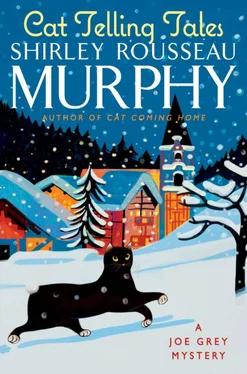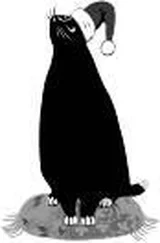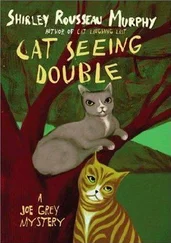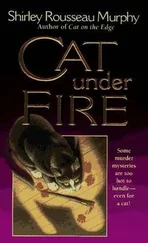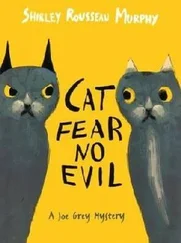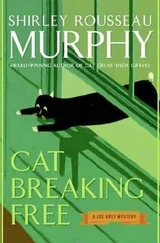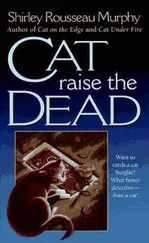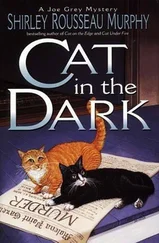Shirley Murphy - Murphy_Shirley_Rousseau_Cat_Telling_Tales_BookFi
Здесь есть возможность читать онлайн «Shirley Murphy - Murphy_Shirley_Rousseau_Cat_Telling_Tales_BookFi» весь текст электронной книги совершенно бесплатно (целиком полную версию без сокращений). В некоторых случаях можно слушать аудио, скачать через торрент в формате fb2 и присутствует краткое содержание. Год выпуска: 2011, Издательство: HarperCollins US, Жанр: Старинная литература, на английском языке. Описание произведения, (предисловие) а так же отзывы посетителей доступны на портале библиотеки ЛибКат.
- Название:Murphy_Shirley_Rousseau_Cat_Telling_Tales_BookFi
- Автор:
- Издательство:HarperCollins US
- Жанр:
- Год:2011
- ISBN:нет данных
- Рейтинг книги:4 / 5. Голосов: 1
-
Избранное:Добавить в избранное
- Отзывы:
-
Ваша оценка:
- 80
- 1
- 2
- 3
- 4
- 5
Murphy_Shirley_Rousseau_Cat_Telling_Tales_BookFi: краткое содержание, описание и аннотация
Предлагаем к чтению аннотацию, описание, краткое содержание или предисловие (зависит от того, что написал сам автор книги «Murphy_Shirley_Rousseau_Cat_Telling_Tales_BookFi»). Если вы не нашли необходимую информацию о книге — напишите в комментариях, мы постараемся отыскать её.
Murphy_Shirley_Rousseau_Cat_Telling_Tales_BookFi — читать онлайн бесплатно полную книгу (весь текст) целиком
Ниже представлен текст книги, разбитый по страницам. Система сохранения места последней прочитанной страницы, позволяет с удобством читать онлайн бесплатно книгу «Murphy_Shirley_Rousseau_Cat_Telling_Tales_BookFi», без необходимости каждый раз заново искать на чём Вы остановились. Поставьте закладку, и сможете в любой момент перейти на страницу, на которой закончили чтение.
Интервал:
Закладка:
He never knew how much Kraft gave her, Gran was so closemouthed, he only knew that that money made him feel strange, he never understood why Kraft gave her money. Kraft said it was because Debbie, Gran’s own daughter, wouldn’t help her out, he said it was Debbie’s duty to help her mother and if she wouldn’t, he would. To Billy, that didn’t make sense; his other aunt didn’t help Gran, or hardly speak to her. The idea of family helping each other wasn’t something he was used to.
If Gran’s money was in the cave, he wanted it before someone else got it. He might be only twelve, but he knew that money laid by meant freedom. You could eat, you didn’t have to work all the time, you could keep your bike running so you could get around. Gran had hidden her whiskey here, so why not the money?
Or, he wondered, had there been more to hide than money?
He’d wondered sometimes when Gran’s car pulled in at midnight but she was so long coming in the house, wondered what she was doing. Sometimes he’d rise and look out to see a faint light shining out between the old door and the boards. He thought she’d gone to get a bottle, thought she’d forgotten there was a nearly full bottle under her bed. But maybe she was hiding something else there.
In the cave, he found the flashlight she’d kept by her whiskey case, and flicked it on, shining the beam along the rough dirt walls. Besides the sour smell of damp earth, the cave stank of mice or rats, and of rotted potatoes from a bag Gran had stored months before. Even the smallest rotted potato smelled like something dead. Billy explored the earthen floor where the whiskey case had stood, which Detective Garza had taken away, then he pushed on back into the darkness.
The dirt between the supporting timbers was packed hard, the dirt walls and ceiling seemed as solid as concrete behind the grid of rough planks. He hadn’t been back in here for a long time. After his mother died, he’d spent weeks in here alone, way at the back, hoping Gran wouldn’t come in and try to cheer him up, which only made him cry. Moving slowly toward the back, he looked along the walls and above him where beams held the earth up, shining the light into earthen crevices behind the timbers.
At the very back there was rubble, loose rocks, three old empty baskets made of half-rotted wooden slats. He searched among these and searched overhead. He was halfway back to the opening when he heard a sound outside, the scrunching of a foot on the rough ground. He switched off the flashlight, stood quiet and still.
The opening darkened as a figure knelt, looking in. “Billy?”
He breathed again, switched on the flashlight. Heard a horse snort, then one of the dogs pushed in past Charlie, nearly knocking him over. “I’m here,” he said, “I’ll be right out.” He was trying to settle the dog, who was rearing up as tall as Billy, licking his face. He was trying to wrestle him away, the flashlight still in his hand when its beam shone low against a four-by-four support.
Where the floor met the rough earthen wall, light reflected off a sliver of something white, shining white.
It was only a speck, which he’d missed from the other side of the rough timber. Kneeling, he dug the earth away, and pulled it free.
It was a plastic sandwich bag stretched thick over a packet of folded white paper. He could see a stamp, could see awkward hand printing, clumsier than his own handwriting that Gran had been stubborn about teaching him: Debbie’s printing. Pushing the dog away more forcefully, he shoved the packet deep in his jeans pocket, hiding it from Charlie. He felt his face heat. He didn’t know why he did that; and he moved on out to join her.
“You okay?”
Billy nodded.
“Dallas stopped by, when he left here. I’d just saddled Redwing, I said I’d ride down this way.” Her green eyes searched his. “That Mr. Zandler was here earlier? I don’t like him much.”
Again Billy nodded. “I won’t tangle with him, if that’s what you’re thinking.”
Charlie grinned, and glanced at her watch. “I thought I’d take a little ride and then, if you want to, we could go shopping.” He thought she meant he could help her carry groceries. “Clothes for Gran’s funeral,” she said. “Maybe chinos and a new polo shirt?”
Billy looked down at his worn jeans with the frayed bottoms, at his run-over boots. He didn’t want her to buy him things, he had his own wages, but he didn’t want to spend them on clothes.
She said, “We could go to J.C. Penney’s.”
Well, he guessed he could do that.
“It isn’t a gift,” she said, “you’ll earn it back soon enough, taking care of our spoiled animals.”
He hadn’t thought of working for clothes. Well, that was all right, he did want to look nice for Gran. He watched her ride away easing the mare into a canter, the two dogs racing ahead. When she’d gone, he opened the plastic bag, took out the letters.
He read them twice, but didn’t understand much. He didn’t want to think about what the earliest ones might mean, the ones dated twelve years ago just after he was born. The surprise was that Debbie had written to Gran at all, when Gran always complained she never heard from her. Why would Gran lie about that? There were twelve letters, the envelopes roughly printed. In the two bulkier envelopes, the letters had been torn into tiny pieces, wadded up, stuffed back inside, and the flap loosely stuck closed again. Besides these, the letter with the earliest postmark was only a few lines:
“No, I don’t want to come there. How can you even ask that. Why would I want to see her and why would I want anything to do with that child? I certainly don’t want to see you again, after you let this happen, what you did was way worse than simple lying. Well, you’ve always lied to us. I thought, in my stupidity, that it was only about your drinking, not about something like this.”
Then came the two torn-up letters, the envelopes postmarked just a few months later. Then nothing for eight years. The next letter was very short.
“How do you know that’s what happened? Go to the cops, if that’s what you think, he deserves whatever he gets. But remember, I won’t help you. And you don’t have an ounce of proof. You go to the cops, they’ll just laugh. As to the other, I’ll have to think about that.”
Whatever this was about, Debbie was sure vague. Was she afraid someone else would read it? What was this about, what was she afraid of?
There was another long space, nearly two years. The letters after that were different and there were more of them, as if she and Gran had talked on the phone maybe, and maybe made up a little. There was no phone in the cabin, but maybe Gran had called her from work. Now, it seemed like they were into something secret, something they didn’t want to write much about. In one, Debbie said, “I have nine sets of papers,” and she had enclosed a list of names and dates, with one single address at the end. That street was up near the Damens’ and Hanni Coon’s remodels. In the next letter she asked, “Did you copy the statements? Call me on my cell but do it soon, it might not be working after next week, not sure I can pay the bill.” Later there was mention of some kind of contracts, and terms Billy didn’t understand. Further on, she complained about a woman. “I hope she double-crosses him, that’s what he deserves.”
The last letter was dated a month ago: “Copy all the discs you can find. Just follow the instructions I gave you. Don’t be afraid of the damn machine. Maybe I should come down there. I wish you knew more about computers.” Whatever they were into sounded illegal. What he wondered was, did this have anything to do with why Gran died?
Читать дальшеИнтервал:
Закладка:
Похожие книги на «Murphy_Shirley_Rousseau_Cat_Telling_Tales_BookFi»
Представляем Вашему вниманию похожие книги на «Murphy_Shirley_Rousseau_Cat_Telling_Tales_BookFi» списком для выбора. Мы отобрали схожую по названию и смыслу литературу в надежде предоставить читателям больше вариантов отыскать новые, интересные, ещё непрочитанные произведения.
Обсуждение, отзывы о книге «Murphy_Shirley_Rousseau_Cat_Telling_Tales_BookFi» и просто собственные мнения читателей. Оставьте ваши комментарии, напишите, что Вы думаете о произведении, его смысле или главных героях. Укажите что конкретно понравилось, а что нет, и почему Вы так считаете.
